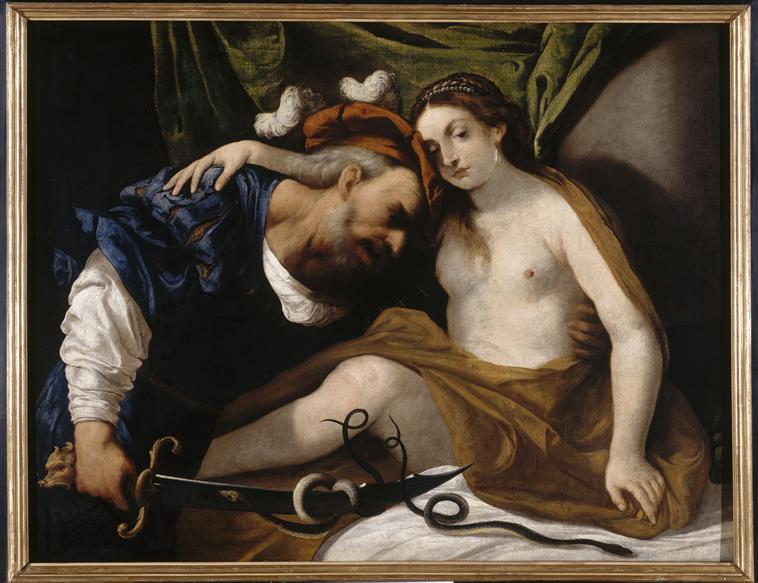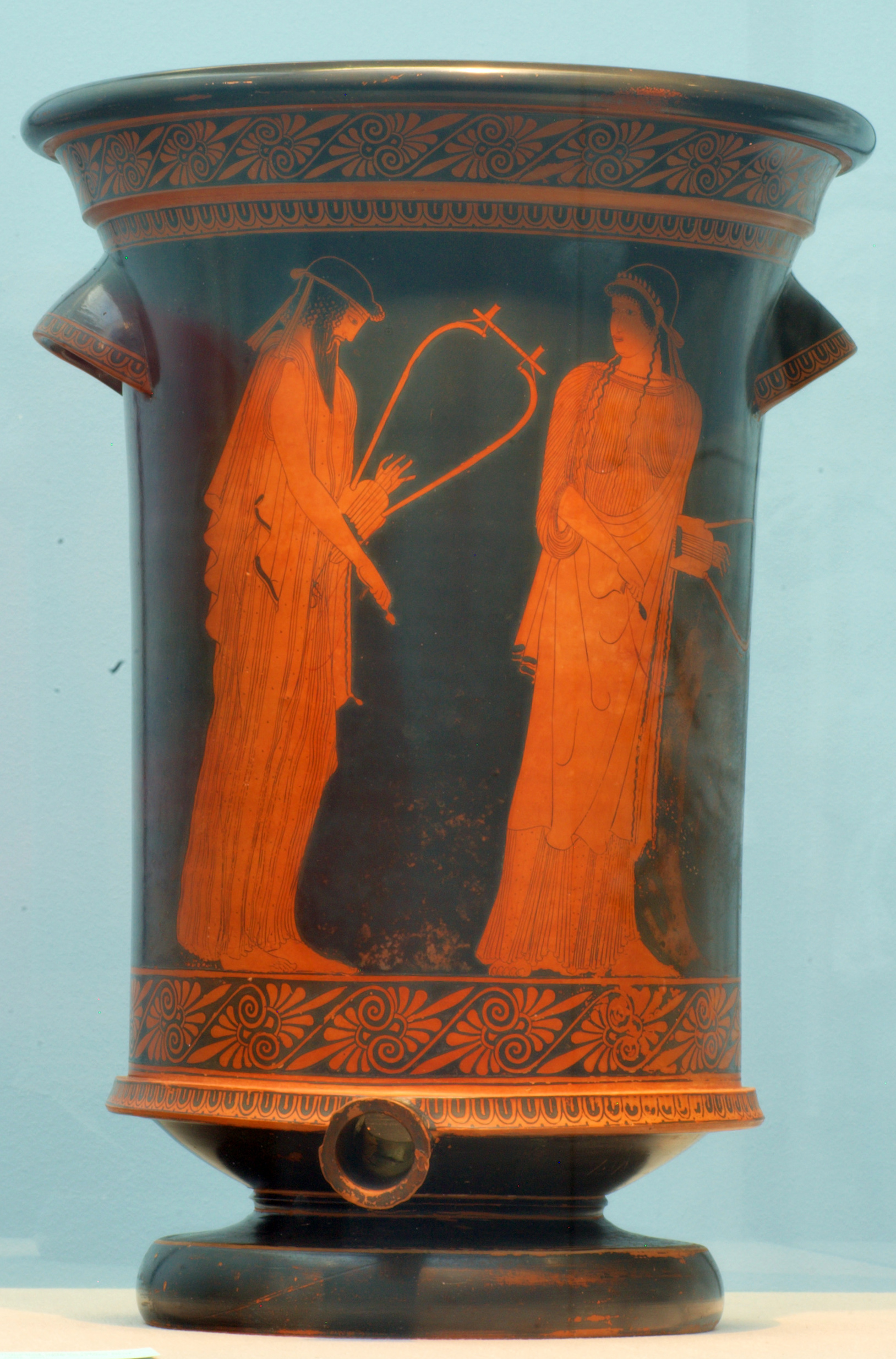|
Kale (mythology)
Kale ( grc, Καλη, 'Beauty') or Cale; Kalleis ( el, Καλλεις, Calleis), in ancient Greek religion, was one of the Charites (Graces). daughters of Zeus (Jupiter). Cale is the spouse of Hephaestus according to some authors (although most have Aphrodite play that role). Cale was also known as Charis and Aglaea. Mythology The name Cale in this passage has led some to conclude that Homer mentions two Charites, Pasithea and Cale, which seems to be a forced separation of three words: ''Pasi thea cale'', meaning ‘the goddess who is beautiful to all men’. Sostratus ( Eustath. ad Hom. p. 1665) relates that Aphrodite and the three Charites, Pasithea, Cale and Euphrosyne, disputed about their beauty with one another, and when Teiresias awarded the prize to Cale he was changed by Aphrodite into an old woman, but Cale rewarded him with a beautiful head of hair and took him to Crete Crete ( el, Κρήτη, translit=, Modern: , Ancient: ) is the largest and most p ... [...More Info...] [...Related Items...] OR: [Wikipedia] [Google] [Baidu] |
Adrian Room
Adrian Richard West Room (27 September 1933, Melksham – 6 November 2010, Stamford, Lincolnshire)''Contemporary Authors Online'', Gale, 2002; accessed 20 May 2013. was a British toponymist and onomastician, a Fellow of the Royal Geographical Society and a prolific author of reference works relating primarily to the origins of word and place-names. Between 1952 and 1979, Room served in the Royal Naval Reserve, Special Branch, retiring as a Lieutenant Commander. Before becoming a full-time author, he was employed at King's College School, Cambridge, where he taught modern languages and was a senior house master. He later, until 1984, worked as a senior lecturer in Russian for the Ministry of Defence. Selected publications *''Place-Names of the World''. London: Routledge & Kegan Paul, 1974. *''Place-name changes since 1900: A world gazetteer''. London: Routledge & Kegan Paul, 1980. *''Naming Names: Stories of Pseudonyms and Name Changes with a Who's Who''. London: Routledge ... [...More Info...] [...Related Items...] OR: [Wikipedia] [Google] [Baidu] |
Greek Goddesses
Greek may refer to: Greece Anything of, from, or related to Greece, a country in Southern Europe: *Greeks, an ethnic group. *Greek language, a branch of the Indo-European language family. **Proto-Greek language, the assumed last common ancestor of all known varieties of Greek. **Mycenaean Greek, most ancient attested form of the language (16th to 11th centuries BC). **Ancient Greek, forms of the language used c. 1000–330 BC. ** Koine Greek, common form of Greek spoken and written during Classical antiquity. ** Medieval Greek or Byzantine Language, language used between the Middle Ages and the Ottoman conquest of Constantinople. ** Modern Greek, varieties spoken in the modern era (from 1453 AD). *Greek alphabet, script used to write the Greek language. * Greek Orthodox Church, several Churches of the Eastern Orthodox Church. *Ancient Greece, the ancient civilization before the end of Antiquity. * Old Greek, the language as spoken from Late Antiquity to around 1500 AD. Other uses ... [...More Info...] [...Related Items...] OR: [Wikipedia] [Google] [Baidu] |
Crete
Crete ( el, Κρήτη, translit=, Modern: , Ancient: ) is the largest and most populous of the Greek islands, the 88th largest island in the world and the fifth largest island in the Mediterranean Sea, after Sicily, Sardinia, Cyprus, and Corsica. Crete rests about south of the Greek mainland, and about southwest of Anatolia. Crete has an area of and a coastline of 1,046 km (650 mi). It bounds the southern border of the Aegean Sea, with the Sea of Crete (or North Cretan Sea) to the north and the Libyan Sea (or South Cretan Sea) to the south. Crete and a number of islands and islets that surround it constitute the Region of Crete ( el, Περιφέρεια Κρήτης, links=no), which is the southernmost of the 13 top-level administrative units of Greece, and the fifth most populous of Greece's regions. Its capital and largest city is Heraklion, on the north shore of the island. , the region had a population of 636,504. The Dodecanese are located ... [...More Info...] [...Related Items...] OR: [Wikipedia] [Google] [Baidu] |
Teiresias
In Greek mythology, Tiresias (; grc, Τειρεσίας, Teiresías) was a blind prophet of Apollo in Thebes, famous for clairvoyance and for being transformed into a woman for seven years. He was the son of the shepherd Everes and the nymph Chariclo. Tiresias participated fully in seven generations in Thebes, beginning as advisor to Cadmus himself. Mythology Eighteen allusions to mythic Tiresias, noted by Luc Brisson, fall into three groups: the first recounts Tiresias' sex-change episode and later his encounter with Zeus and Hera; the second group recounts his blinding by Athena; the third, all but lost, seems to have recounted the misadventures of Tiresias. Blindness and gift of prophecy Like other oracles, how Tiresias obtained his information varied: sometimes, he would receive visions; other times he would listen for the songs of birds, or ask for a description of visions and pictures appearing within the smoke of burnt offerings or entrails, and so interpret them ... [...More Info...] [...Related Items...] OR: [Wikipedia] [Google] [Baidu] |
Euphrosyne (mythology)
Euphrosyne (; grc, Εὐφροσύνη), in ancient Greek religion and mythology, was one of the Charites, known in ancient Rome as the ''Gratiae'' (Graces). She was sometimes called Euthymia (Εὐθυμία) or Eutychia (Εὐτυχία). Family According to Hesiod, Euphrosyne and her sisters Thalia and Aglaea were daughters of Zeus and the Oceanid Eurynome. Alternative parentage may be Zeus and Eurydome, Eurymedousa, or Euanthe; Dionysus and Kronois; or Helios and the Naiad Aegle. In some accounts, Euphrosyne was a daughter of the primordial gods, Erebus (Darkness) and Nyx (Night).Hyginus, ''Fabulae'Preface/ref>"From Nox/ Nyx (Night) and Erebus ere born Fatum/ Moros (Fate), Senectus/ Geras (Old Age), Mors/ Thanatos (Death), Letum (Dissolution), Continentia (Moderation), Somnus/ Hypnos (Sleep), Somnia/ Oneiroi (Dreams), Amor (Love)--that is Lysimeles, Epiphron (Prudence), Porphyrion, Epaphus, Discordia/ Eris (Discord), Miseria/ Oizys (Misery), Petulantia/ ... [...More Info...] [...Related Items...] OR: [Wikipedia] [Google] [Baidu] |
Eustathius Of Thessalonica
Eustathius of Thessalonica (or Eustathios of Thessalonike; el, Εὐστάθιος Θεσσαλονίκης; c. 1115 – 1195/6) was a Byzantine Greek scholar and Archbishop of Thessalonica. He is most noted for his contemporary account of the sack of Thessalonica by the Normans in 1185, for his orations and for his commentaries on Homer, which incorporate many remarks by much earlier researchers. He was officially canonized on June 10, 1988, and his feast day is on September 20.Great Synaxaristes: Ὁ Ἅγιος Εὐστάθιος ὁ Κατάφλωρος Ἀρχιεπίσκοπος Θεσσαλονίκης'' 20 Σεπτεμβρίου. ΜΕΓΑΣ ΣΥΝΑΞΑΡΙΣΤΗΣ. Life A pupil of Nicholas Kataphloron, Eustathius was appointed to the offices of superintendent of petitions (, '' epi ton deeseon''), professor of rhetoric (), and was ordained a deacon in Constantinople. He was ordained bishop of Myra. Around the year 1178, he was appointed to the archbishopric of T ... [...More Info...] [...Related Items...] OR: [Wikipedia] [Google] [Baidu] |
Robert Graves
Captain Robert von Ranke Graves (24 July 1895 – 7 December 1985) was a British poet, historical novelist and critic. His father was Alfred Perceval Graves, a celebrated Irish poet and figure in the Gaelic revival; they were both Celticists and students of Irish mythology. Graves produced more than 140 works in his lifetime. His poems, his translations and innovative analysis of the Greek myths, his memoir of his early life—including his role in World War I—'' Good-Bye to All That'', and his speculative study of poetic inspiration '' The White Goddess'' have never been out of print. He is also a renowned short story writer, with stories such as "The Tenement" still being popular today. He earned his living from writing, particularly popular historical novels such as '' I, Claudius''; ''King Jesus''; ''The Golden Fleece''; and '' Count Belisarius''. He also was a prominent translator of Classical Latin and Ancient Greek texts; his versions of '' The Twelve Caesars'' ... [...More Info...] [...Related Items...] OR: [Wikipedia] [Google] [Baidu] |
Dictionary Of Greek And Roman Biography And Mythology
The ''Dictionary of Greek and Roman Biography and Mythology'' (1849, originally published 1844 under a slightly different title) is an encyclopedia/biographical dictionary. Edited by William Smith, the dictionary spans three volumes and 3,700 pages. It is a classic work of 19th-century lexicography. The work is a companion to Smith's '' Dictionary of Greek and Roman Antiquities'' and ''Dictionary of Greek and Roman Geography''. Authors and scope The work lists thirty-five authors in addition to the editor, who was also the author of the unsigned articles. The other authors were classical scholars, primarily from Oxford, Cambridge, Rugby School, and the University of Bonn, but some were from other institutions. Many of the mythological entries were the work of the German expatriate Leonhard Schmitz, who helped to popularise German classical scholarship in Britain. With respect to biographies, Smith intended to be comprehensive. In the preface, he writes: Much of the v ... [...More Info...] [...Related Items...] OR: [Wikipedia] [Google] [Baidu] |
William Smith (lexicographer)
Sir William Smith (20 May 1813 – 7 October 1893) was an English lexicographer. He became known for his advances in the teaching of Greek and Latin in schools. Early life Smith was born in Enfield in 1813 to Nonconformist parents. He attended the Madras House school of John Allen in Hackney. Originally destined for a theological career, he instead became articled to a solicitor. Meanwhile, he taught himself classics in his spare time, and when he entered University College London carried off both the Greek and Latin prizes. He was entered at Gray's Inn in 1830, but gave up his legal studies for a post at University College School and began to write on classical subjects. Lexicography Smith next turned his attention to lexicography. His first attempt was '' A Dictionary of Greek and Roman Antiquities'', which appeared in 1842, the greater part being written by him. Then followed the ''Dictionary of Greek and Roman Biography and Mythology'' in 1849. A parallel '' Dicti ... [...More Info...] [...Related Items...] OR: [Wikipedia] [Google] [Baidu] |
Pasithea
In Greek mythology, Pasithea ( grc, Πασιθέα means "relaxation"), or Pasithee, was one of the Charites (Graces), and the personification of relaxation, meditation, hallucinations and all other altered states of consciousness. The Charites are usually said to be the daughters of Zeus and Eurynome, but Pasithea's parentage is given (by the poet Nonnus) as Hera and Dionysus. She was married to Hypnos, the god of sleep. Family Her sisters are Aglaea ("Splendor"), Euphrosyne ("Mirth"), and Thalia ("Good Cheer"). In Roman mythology they were known as the Gratiae, the "Graces". In book 14 of Homer's Iliad, Pasithea was one of the younger Charites. Hera promises her in marriage to Hypnos the god of sleep in exchange for him ensuring Zeus was temporarily removed from the action of the Trojan War. Robert Graves thinks that Homer also mentions the names of two Charites, Pasithea and Cale ("Beauty"), but the two Charites Homer used for Hesiod's Aglaea. Although the Graces usual ... [...More Info...] [...Related Items...] OR: [Wikipedia] [Google] [Baidu] |
Greek Lyric
Greek lyric is the body of lyric poetry written in dialects of Ancient Greek. It is primarily associated with the early 7th to the early 5th centuries BC, sometimes called the "Lyric Age of Greece", but continued to be written into the Hellenistic and Imperial periods. Background Lyric is one of three broad categories of poetry in classical antiquity, along with drama and epic, according to the scheme of the "natural forms of poetry" developed by Goethe in the early nineteenth century. (Drama is considered a form of poetry here because both tragedy and comedy were written in verse in ancient Greece.) Culturally, Greek lyric is the product of the political, social and intellectual milieu of the Greek ''polis'' ("city-state"). Much of Greek lyric is occasional poetry, composed for public or private performance by a soloist or chorus to mark particular occasions. The symposium ("drinking party") was one setting in which lyric poems were performed.Miller, ''Greek Lyric: An Anthology ... [...More Info...] [...Related Items...] OR: [Wikipedia] [Google] [Baidu] |







